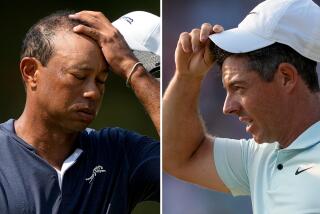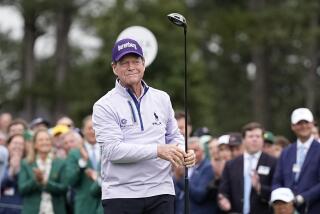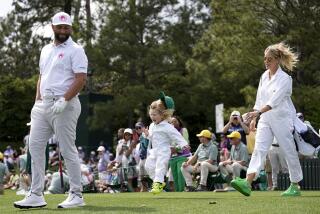Golf / Mal Florence : Faldo Chalks Up Another Win for Europeans
- Share via
With Nick Faldo’s victory in the recent Masters tournament, he became the fourth European to win that prestigious event since 1983.
From 1970 through 1983, American players won 12 of 14 British Open championships. But an American hasn’t won in the last five years.
Furthermore, a European team has won the last two Ryder Cup matches, in 1985 and ’87.
That is an indication that Europeans have become a dominant factor in the game and, perhaps, underscoring the Americans waning influence on it, at least in the top echelon.
“We’re better than (the Americans) are now,” Tony Jacklin, captain of the European Ryder Cup team, said before the 1988 British Open. “It’s that simple, isn’t it?”
That remark infuriated Mark Calcavecchia, who has put a high priority on winning this year’s Ryder Cup, an event that wasn’t considered that significant when American pros dominated it.
“We’re slowly proving what we’re made of,” said Faldo, who won the 1987 British Open and lost the 1988 U.S. Open in a playoff to Curtis Strange.
Faldo, who plays both the European and American tours, added that the standards have been raised on the European tour.
“The world of international golf is very strong now,” he said.
So strong that American tournaments, once a goal for Europeans, are not as alluring as they once were.
For example, Seve Ballesteros of Spain, the current British Open champion, chose not to compete in the 1988 World Series of Golf, or last January’s Tournament of Champions in La Costa.
Faldo has indicated that he won’t play in this year’s Tournament of Champions. He said he plans to take a break from golf in January and February.
“We may go on a safari in Kenya,” he said.
Faldo may also pass up the season-ending, $2.5-million Nabisco Championships, the richest tournament in the world. The October event falls on the same dates as the Volvo Masters in Spain, in which Faldo is the defending champion.
“I haven’t yet decided,” he said. “No matter what I do, someone is going to be unhappy.”
Faldo identified himself, Ballesteros, Greg Norman of Australia, Sandy Lyle of England, Ian Woosnam of Wales and Strange as the top half-dozen players in the world now. Four are Europeans.
Strange, the player of the year in 1988, has yet to win a tour event this year.
That’s not a knock on Strange, it just emphasizes that there is more quality depth on the American tour now.
However, there isn’t a dominating player, such as Jack Nicklaus and Tom Watson were in their heydays.
The Europeans players, such as Faldo, Ballesteros and Lyle, have stepped into that void. They don’t have strength in numbers, but the quality is there.
Faldo sent a message of sorts when he showed up at the Masters presentation ceremony wearing a cap emblazoned with the word London and a Union Jack.
Masters Chairman Hord Hardin asked Faldo to remove the cap. When Faldo balked, Hardin said, chuckling, “Well, how about going back to the 10th tee (the first playoff hole) then?”
Faldo removed the cap.
Pat Bradley’s victory last Sunday in the AI Star/Centinela Hospital tournament at Rancho Park has to rate as one of the most emotionally stirring moments in the game.
Her struggle to come back from Graves’ disease, a debilitating thyroid disorder, has been well chronicled. Now Bradley is looking ahead to a future she didn’t think she had.
“I have been given a second chance, a second life and I’m going to enjoy it to the fullest,” she said. “Last year I thought, ‘Is this the way you feel when it’s over, when you’re nerves can’t handle it anymore? Is somebody telling me my time is over with? Am I now supposed to find something else to do?’
“Everything up to the that time was gravy. Everything I touched turned to gold. I’m just thankful that there was something physically wrong with me that could be taken care of (with medication) and that I could come back and do what I enjoy best, play golf.”
She earned $67,500 by winning, increasing her LPGA-leading career earnings past $2.5 million.
But Bradley, 38, wasn’t thinking of money Sunday. She is just grateful that her career, which seemed doomed, has been extended.
George Bush has only been in office four months and already he’s under fire for his golf game, or lack of it.
Max Elbin, a pro at the Burning Tree club in Maryland, told Golf Digest: “The President simply has no feel for distance, and he doesn’t know how to use his hands effectively. He’s pretty much all over the place. Concentrating on these shots is really tough for him. I know he wants to improve, he’s told me so. But he just doesn’t have any touch, or the seriousness to develop the finesse.”
Vice President Dan Quayle, who once earned the No. 1 spot on the DePauw golf team, was also criticized for his lack of finesse by Congressman Bill Hefner (D-N.C), a former playing companion.
“Finesse is not Dan’s strong suit,” Hefner said. “He misses a lot more putts than drives. Dan still feels he should make everything within 10 feet, and when he doesn’t he gets disgusted.”
Golf Notes
USC’s golf team won the Stanford Cardinal Intercollegiate golf tournament April 15 at the Stanford course with a three-round score of 858. In individual competition, USC’s Earl Morley and Brian Pemberton finished second and third, respectively, behind Fresno State’s Randy Bridge. . . . The U.S. National Seniors Golf Assn. will hold its 19th annual spring championship May 16-18 at Mission Hills, Palm Valley and Monterey Country Clubs in Palm Desert.
A $50,000 prize was donated by All Set hair spray for the first LPGA player to break the tour’s low-round record. Vicki Fergon set it with a 62, 11 under par, at a tournament in San Jose in 1984.
Bob Charles, who grew up in New Zealand and is on the Senior PGA Tour, told Golf Digest that it’s understandable why foreign players are becoming more dominant. “American players these days are like spoiled babies,” Charles said. “They expect everything to be arranged perfectly for them wherever they go. If the power goes out in their hotel, if there’s no television, no courtesy car, they all but refuse to play. They can’t stand the slightest inconvenience. Foreign players are used to all kinds of difficulties. They play better under difficult weather and course conditions because they’re used to it.” Charles added that Jack Nicklaus and Arnold Palmer were exceptions because they traveled frequently and learned to cope with less than perfect circumstances.
More to Read
Go beyond the scoreboard
Get the latest on L.A.'s teams in the daily Sports Report newsletter.
You may occasionally receive promotional content from the Los Angeles Times.










